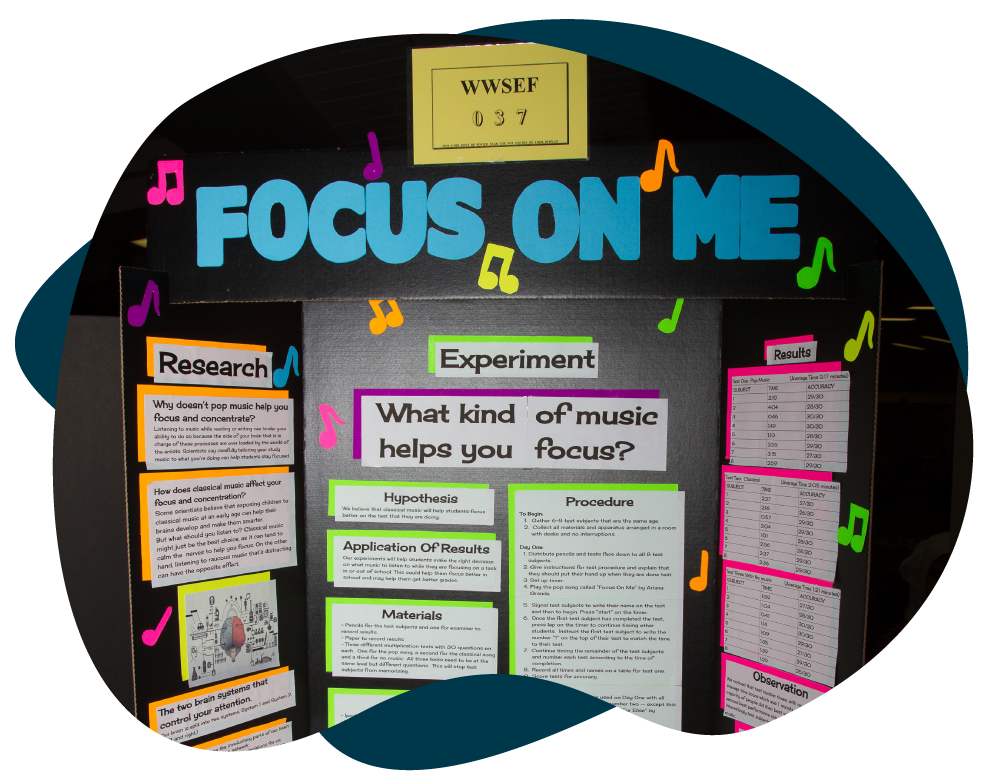| EXPERIMENT | INNOVATION | STUDY | LEVEL 1 (Poor) | LEVEL 2 (Fair) | LEVEL 3 (Good) | LEVEL 4 (Excellent) |
Definition: An investigation undertaken to test a scientific hypothesis using experiments.
Experimental variables, if identified, are controlled to some extent. | Definition: The development and evaluation of innovative devices, models, or techniques or approaches in technology, engineering, or computers (hard/ software) | Definition: A collection and analysis of data to reveal evidence of a fact or a situation of scientific interest. It could include a study of cause and effect relationships or theoretical investigations of scientific data. | Little imagination shown, Project design is simple with minimal student input.
A textbook or magazine type project. | Some creativity shown in a project of fair to good design. Standard approach using common resources or equipment. Topic is a current or common one. | Imaginative project.
Good use of available resources. Well thought out above ordinary approach.
Creativity in design and or use of materials. | A highly original project or a novel approach. Shows resourcefulness,
creativity in design, use of equipment and/or construction of a project. |
Level 1 (Poor):
Duplication of a known experiment to confirm a totally predictable hypothesis. | Level 1 (Poor): Build models (devices) to duplicate existing technology. | Level 1 (Poor): Study existing printed material related to a basic issue. | Possible Grades:
20, 21, 22, 23 | Possible Grades:
24, 25, 26, 27 | Possible Grades:
28, 29, 30, 31 | Possible Grades:
32, 33, 34, 35 |
| Level 2 (Fair): Extend a known experiment through modification of procedures, data gathering, and application. | Level 2 (Fair): Make improvements to, or demonstrate new applications for existing technological systems or equipment and justify them. | Level 2 (Fair): Study material collected through compilation of existing data and through personal observations.
The display attempts to address a specific issue. | Possible Grades:
25, 26, 27, 28 | Possible Grades:
29, 30, 31, 32 | Possible Grades:
33, 34, 35, 36 | Possible Grades:
37, 38, 39, 40 |
| Level 3 (Good): Devise/carry-out an original experiment with controls. Variables are identified and some significant variables are controlled. Analysis with graphs or simple statistics. | Level 3 (Good): Designing and building innovative technology or providing adaptations to existing technology that will have economic applications and or human benefit. | Level 3 (Good): Study based on observations and literary research illustrating various options for dealing with a relevant issue. Appropriate analysis (arithmetical, statistical, or graphical) of some significant variable(s). | Possible Grades:
30, 31, 32, 33 | Possible Grades:
34, 35, 36, 37 | Possible Grades:
38, 39, 40, 41 | Possible Grades:
42, 43, 44, 45 |
| Level 4 (Excellent): Devise and carry out original experimental research, which attempts to control or investigate most significant variables. Data analysis includes statistical analysis. | Level 4 (Excellent): Integrate several technologies, inventions or designs and construct an innovative technological system that will have commercial and/or human benefit. | Level 4 (Excellent): Study correlating information from a variety of significant sources that may illustrate cause and effect or original solutions to current problems through synthesis. Significant variable(s) are identified with in-depth statistical analysis of data. | Possible Grades:
35, 36, 37, 38 | Possible Grades:
39, 40, 41, 42 | Possible Grades:
43, 44, 45, 46 | Possible Grades:
47, 48, 49, 50 |





